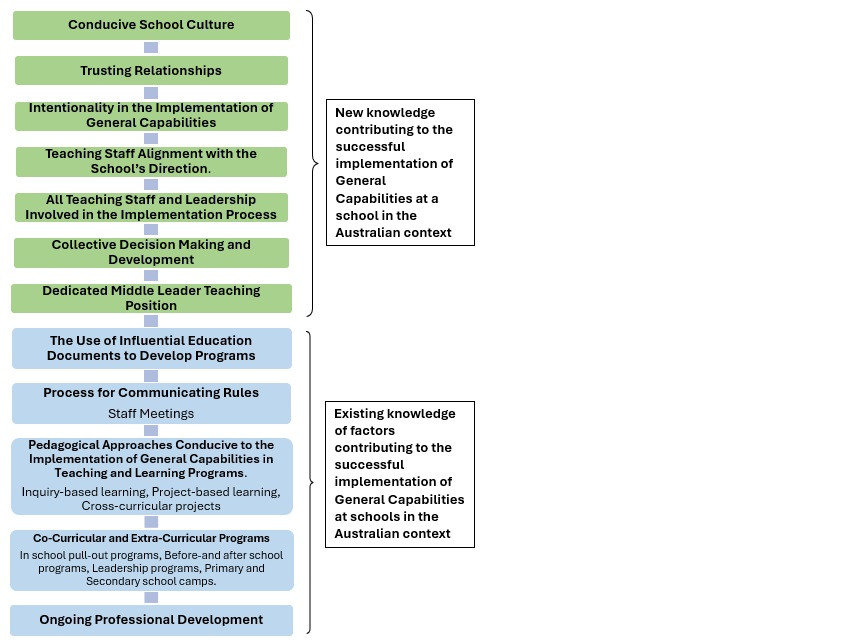In the latest annual Teacher reader survey, you let us know you’d like more content on the topic of curriculum implementation. At the ACER Research Conference 2025, poster presenter Dr Liana Luyt showcased her research into the conditions supporting and maintaining the effective incorporation of the General Capabilities of the Australian Curriculum. In this article, she shares the details of her research and an implementation guideline resource for school leaders.
Worldwide, many organisations are increasingly realising that individuals need specific skills to thrive in a world that is ever-changing (Weldon, 2019). Schools, specifically, are in an excellent position to help prepare students for a changing social, labour, technological and economic environment (Fadel, Bialik, & Trilling, 2015).
The General Capabilities in the Australian Curriculum is a crucial dimension designed to assist school students in developing the skills needed to address these issues. They consist of 7 areas: Literacy, Numeracy, Critical and Creative Thinking, Intercultural Understanding, Personal and Social Understanding, and Digital Literacy).
[General Capabilities] encompass knowledge, skills, behaviours and dispositions that students develop and apply to content knowledge and that support them in becoming successful learners, confident and creative individuals and active and informed citizens. (Australian Curriculum Assessment and Reporting Authority [ACARA], 2011, p. 12)
Limited information, however, is available on the level of success in incorporating and teaching the General Capabilities within schools (Scoular & Care, 2018), as well as to what extent this curriculum dimension is included in learning programs (Weldon, 2019). Previous research has stated that the General Capabilities can be challenging to teach and assess (Field, 2023).
Considering this, I identified a research gap within this topic consisting of 2 parts:
- A paucity of literature on the effective implementation of General Capabilities within teaching and learning programs in Australian schools.
- Much of the identified literature providing advice on implementing the Capabilities into teaching programs lacked empirical evidence, which was also an observation made by Christian, Cameron and Pearce (2023).
Determining effective General Capabilities implementation practices
To address this research gap, I conducted a single school ethnographic case study aimed at investigating how the General Capabilities of the Australian Curriculum was incorporated into school programs. I wanted to know:
What conditions initiate, support and maintain the effective incorporation and implementation of the General Capabilities of the Australian Curriculum?
I also had 3 supporting research questions:
- What structures, resources and practices have been developed to initiate, support and maintain General Capabilities incorporation at whole-school and classroom levels?
- What challenges and barriers inhibit school leaders to prioritise General Capabilities implementation at whole-school and classroom levels?
- What perspectives do implementation staff hold about the General Capabilities and how are these evident in implementation and incorporation practices?
As the aim was to gain knowledge and insight into the effective implementation of General Capabilities within teaching and learning programs, a school identified as a leader within this space in Western Australia was purposefully selected to participate. Semi-structured interviews were conducted with key teachers and leaders at the school, and school documentation was also analysed.
What were the findings?
The findings of the study supported existing knowledge about effective implementation processes of the General Capabilities in school programs; however, the study also highlighted significant new knowledge within this field (see Figure 1 below).

Figure 1
A graphic representation showing the 7 areas of new knowledge identified by the study and the 5 areas of existing knowledge available in the literature about the effective implementation of General Capabilities.
Reflecting on the research questions, it was clear that effective school-based implementation of the General Capabilities involves more than the availability of specific resources, pedagogies and programs and starts well before any resource development or lesson planning.
It was clear from the findings that the school’s success in effective implementation of the General Capabilities within teaching and learning programs was underscored by a strong intentionality to teach these skills. This purposeful planning was witnessed in the programs and mentioned in the interviews. Teachers and leaders at the school were aligned in their goals for the school, and the intentionality behind the planning was supported by a culture of collective decision-making regarding curriculum implementation.
All teachers form part of the decision-making processes and should purposefully plan for the incorporation of the General Capabilities into their programs. Also, as with any curriculum area, ongoing professional development in the area of General Capabilities is a necessity. As teachers, we need to remain at the forefront of new developments in learning enhancement and curriculum implementation in order to positively impact student learning.
Effective implementation is underscored by a conducive and focused school culture supported by trusting relationships. A school’s culture is described as the ‘basic personality’ of a school (Ismail et al., 2022, p. 262), and a healthy school culture is a catalyst behind realising school goals and encourages overall teacher satisfaction, collaboration and autonomy. This can lead to the development of strong trusting relationships among staff to work towards common initiatives in a school. It was clear from my research results that embedding the General Capabilities was supported by an overall conducive school culture.
Ultimately, a significant contribution of this study is that it led to the development of the General Capabilities Implementation Guidelines for School Leaders, a one-page handout that could be used to shape and guide the General Capabilities implementation process at any school.
Click here to download the guideline resource.
References
Australian Curriculum Assessment and Reporting Authority [ACARA]. (2011). General Capabilities Consultation Report. https://docs.acara.edu.au/resources/General_Capabilities_-_Consultation_Report_-_December__2011.pdf
Christian, B. J., Cameron, K. A., & Pearce, R. (2023). Growing Capable Kids: Exploring the Nexus between the Australian Curriculum’s General Capabilities, Global Competencies, and One School Garden Program. Australian Journal of Outdoor Education, 26(1), 127–146. https://doi.org/10.1007/s42322-022-00117-x
Fadel, C., Bialik, M., & Trilling, B. (2015). Four-Dimensional Education: The Competencies Learners Need to Succeed. Center for Curriculum Redesign. https://curriculumredesign.org/our-work/four-dimensional-21st-century-education-learning-competencies-future-2030/
Field, S. (2023). Transferable Competences And Personal, Social And Employability (PSE) Qualifications: Some International Evidence. Gatsby Charitable Foundation. https://www.gatsby.org.uk/uploads/education/international-comparisons-transferable-and-pse-skills.pdf
Gonski, D., Arcus, T., Boston, K., Gould, V., Johnson, W., O’Brien, L., Perry, L., & Roberts, M. (2018). Through Growth to Achievement: Report of the Review to Achieve Educational Excellence in Australian Schools. Department of Education and Training. https://www.education.gov.au/quality-schools-package/resources/through-growth-achievement-report-review-achieve-educational-excellence-australian-schools
Ismail, M., Khatibi, A., & Azam, S. M. F. (2022). Impact of School Culture on School Effectiveness in Government Schools in Maldives. Participatory Educational Research, 9(2), 261-279. https://doi.org/10.17275/per.22.39.9.2
Scoular, C., & Care, E. (2018). Teaching Twenty-First Century Skills: Implications at System Levels in Australia. In E. Care, P. Griffin, & M. Wilson (Eds.), Assessment and Teaching of 21st Century Skills: Research and Applications (pp. 145-162). Springer International Publishing. https://doi.org/10.1007/978-3-319-65368-6_9
Weldon, P. (2019). Changing Priorities: The Role of General Capabilities In The Curriculum. ACER. https://research.acer.edu.au/nswcurriculumreview/3
Dr Liana Luyt says: ‘All teachers form part of the decision-making processes and should purposefully plan for the incorporation of the General Capabilities into their programs.’
As a school leader, reflect on this statement. Does it apply to your school setting? Is this something you’re already doing well, or is it something that could be improved on? If there are improvements to be made, what would a good first step be?
